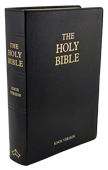The Holy Bible – Knox Translation
The Epistle of the Blessed Apostle Paul to the Hebrews
|
Chapter 7
|
1
It was this Melchisedech, king of Salem, and priest of the most high God, who met Abraham and blessed him on his way home, after the defeat of the kings;✻
2
and to him Abraham gave a tenth of his spoils. Observe, in the first place, that his name means, the king of justice; and further that he is king of Salem, that is, of peace.
3
That is all; no name of father or mother, no pedigree, no date of birth or of death; there he stands, eternally, a priest, the true figure of the Son of God.✻
4
Consider how great a man was this, to whom the patriarch Abraham himself gave a tenth part of his chosen spoil.
5
The descendants of Levi, when the priesthood is conferred on them, are allowed by the provisions of the law to take tithes from God’s people, although these, like themselves, come from the privileged stock of Abraham; after all, they are their brothers;
6
here is one who owns no common descent with them, taking tithes from Abraham himself. He blesses him, too, blesses the man to whom the promises have been made;
7
and it is beyond all question that blessings are only given by what is greater in dignity to what is less.
8
In the one case, the priests who receive tithe are only mortal men; in the other, it is a priest (so the record tells us) who lives on.
9
And indeed, there is a sense in which we can say that Levi, who receives the tithe, paid tithe himself with Abraham;
10
as the heir of Abraham’s body, he was present in the person of his ancestor, when he met Melchisedech.
11
Now, there could be no need for a fresh priest to arise, accredited with Melchisedech’s priesthood, not with Aaron’s, if the Levitical priesthood had brought fulfilment. And it is on the Levitical priesthood that the law given to God’s people is founded.
12
When the priesthood is altered, the law, necessarily, is altered with it.
13
After all, he to whom the prophecy relates belonged to a different tribe, which never produced a man to stand at the altar;
14
our Lord took his origin from Juda, that is certain, and Moses in speaking of this tribe, said nothing about priests.✻
15
And something further becomes evident, when a fresh priest arises to fulfil the type of Melchisedech,✻
16
appointed, not to obey the law, with its outward observances, but in the power of an unending life;
17
(Thou art a priest in the line of Melchisedech, God says of him, for ever).
18
The old observance is abrogated now, powerless as it was to help us;
19
the law had nothing in it of final achievement. Instead, a fuller hope has been brought into our lives, enabling us to come close to God.
20
And this time there is a ratification by oath; none was taken when those other priests were appointed,
21
but the new priest is appointed with an oath, when God says to him, The Lord has sworn an irrevocable oath, Thou art a priest for ever;
22
all the more solemn, then, is that covenant for which Jesus has been given us as our surety.
23
Of those other priests there was a succession, since death denied them permanence;
24
whereas Jesus continues for ever, and his priestly office is unchanging;
25
that is why he can give eternal salvation to those who through him make their way to God; he lives on still to make intercession on our behalf.✻
26
Such was the high priest that suited our need, holy and guiltless and undefiled, not reckoned among us sinners, lifted high above all the heavens;
27
one who has no need to do as those other priests did, offering a twofold sacrifice day by day, first for his own sins, then for those of the people. What he has done he has done once for all; and the offering was himself.✻
28
The law makes high priests of men, and men are frail; promise and oath, now, have superseded the law; our high priest, now, is that Son who has reached his full achievement for all eternity.


